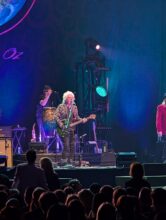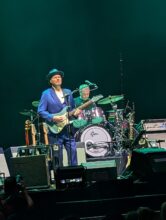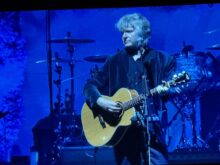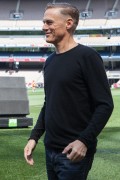In June 1989 Paul McCartney released ‘Flowers In The Dirt’, his 16th album post-The Beatles.
McCartney wanted to create something different for ‘Flowers In The Dirt’. His previous album’s ‘Press To Play’ struggled to deliver a bonafide hit, something McCartney was not used to.
For Flowers In The Dirt, McCartney recruited Elvis Costello as his co-writer, who some considered a contemporary of John Lennon. Elvis is credited under his real name Declan McManus on four tracks ‘My Brave Face’, ‘You Want Her Too’, ‘Don’t Be Careless Love’ and ‘The Day Is Done’.
In March, an expanded edition of ‘Flowers In The Dirt’ was released through Universal Music. The 2017 edition of the album featured two discs of the original demos by McCartney and Costello plus a DVD of the music videos.
Paul McCartney Flowers In the Dirt Q and A
Q: One difference between FITD and a lot of your solo work is that a third of the album was co-written with Elvis Costello. How did that come about?
P: The idea came from my management. They said, ‘Would you like to collaborate with Elvis Costello? He’s up for it, do you fancy it?’ I said yeah, he’s from Liverpool, we’ve got a lot of stuff in common.
Q: What was the process like?
P: We had a great time. We worked at my studio in Sussex. There’s a room there, which is kind of my office, mainly to take phone calls and write. We used the same process that John [Lennon] and I used to do. He was really great to work with and we had a great laugh. We would sit down opposite each other, which is how I would sit down with John. We sat down with two acoustic guitars, and he’s right handed and I’m left handed so it would look like a mirror image.
Q: You worked with a number of different producers on the album. Was this intentional?
P: I often find myself just trying out different people. First of all I had the Elvis songs to kick the album off and Elvis introduced me to Mitchell Froom, who I didn’t know, but I liked him. I thought OK, we’ll try this and see if it works. So the band and me did the Elvis songs with Mitchell and we did those pretty much like I would make a record… straight-forward and live-ish. But I had a couple of other songs, and I was intrigued to try other methods. I just didn’t want to do the album all the same way.
Q: Then there were the Trevor Horn tracks.
P: When I was looking around for who I’d work with on this album, Trevor’s name came up and I’d heard these rumours that kind of go round the business and stuff like ‘oh he takes three months to make a single’, probably because on one of the Frankie ones, I think, he did take that long, and I didn’t fancy getting involved in a single that took three months, just not my kind of style. So I said to Trevor and Steve Lipson, who he works with, ‘do you fancy trying to do something over two days?’ ‘cause you know, I thought it could kind of throw the cat amongst the pigeons for them as well as for me.
Q: Do you remember the first experience with Trevor?
P: I said I’ve got this crazy little thing you won’t like, it’s called ‘Rough Ride’. He said ‘I love the title already’… it grew from a nothing little 12-bar and by the end of the second day we’d mixed it, which is pretty unheard of these days… they came back with a tarted up version and I said I think it’s a Paul Goes To Hollywood… type of thing, so we kept the original!
Q: Some of the bonus video material on the new re-issue package shows you, Elvis and the band mucking around a lot together during the sessions. Were they fun times?
P: You’ve got to have silly moments ‘cause otherwise it can get a bit intense sometimes, trying to get a take of something. So yeah we had some fairly silly times, and they were quite a silly band as well. It’s good to try and have a laugh, it just releases the tension, I don’t like things too serious myself really. We got into it for a laugh, you know, music, so there’s no point getting it all serious now.
Q: This was a new band too that you went on to tour with following the release of FITD. How did you put the band together?
Well, first we got Hamish Stuart (guitars/vocals) involved, who used to be with the Average White Band. His voice blends very nicely with mine, he’s a real good singer, a very soulful singer. Chris Witton the drummer showed up when we were doing some jamming in London and in those sessions, we recorded some of those old rock and roll things and they became the Russian album that we released in Russia, the first gold disk to come out of Russia I might tell you, he said proudly. And then Linda of course… I said to her ‘can you handle this being in a band again?’ ‘cause she did real good with Wings, although she got a lot of flack, and we enjoyed being together so she came in for that really. And then Robbie Macintosh, he’s a real good guitar player and I’d worked with him before. Finally Paul Wickins was the keyboard guy who completed the line up, and he’s just a brilliant musician – he’s still in my band today.
Q: Why did you want to go back on tour at this point?
P: When I was making the album I got on really well with the band, we had a laugh, we seemed to enjoy each other’s company, so what we did eventually was just the logical progression from that is to stay as a band and what should we do? Go on tour, sounds like the thing to do. And I think ‘cause I was comfortable with them and I enjoyed making music with them there wasn’t any kind of a pressure and it was better than just sitting around!
Q: When you were writing the album did you have touring in mind?
P: You’re always thinking, ‘Let’s get some new songs and take them on tour’. You hope your new songs are going to work. Something like ‘My Brave Face’ would be a song that nobody knew at the beginning of the tour, and then everybody knew it at the end and it was one of the high spots of the whole tour. So you’re always looking at that when you make a new record before a tour. You’re hoping something will stand out. I really wanted an album I could go out on tour with, and album people could relate to.
Q: Is it true that Elvis Costello got you using your famous Hofner bass again during the recording sessions?
P: I had sort of parked it away. I had thought I had outgrown it, so I was using a more contemporary bass. Elvis requested that we use it on one of the tracks and ever since I’ve been playing it and it gets better and better!
Q: You mentioned ‘My Brave Face’ as a song that went on to become a live favourite. It has a very distinctive melodious McCartney bass style.
P: Yeah well I suppose that comes out of Elvis Costello who I wrote this one with. This was when he said ‘what about your Hofner bass? Violin bass, the Beatle bass?’ and I was saying ‘well I can try it but it’s not very good at keeping in tune’ which it isn’t, ‘cause they’re not very expensive instruments, I got it a long time ago. But he said ‘but I love the sound of it, go on lets try it’ so I said ‘yeah sure’, so I got it out, tried it and that, and it recorded great that’s the thing about it, it’s got a lovely tone for a little bass. So that’s how that riff arrived, ‘cause it was sounding great it makes you want to play a nice little distinctive riff. So I got into that, I suppose by request. By the way I’ve done some work on it and it now stays perfectly in tune.
Q: As with all your songs a lot of people read different things in to your lyrics and try and work out what’s personal. At the time of release you spoke about the song ‘Put It There’ being inspired by your Dad?
P: Well a lot of the songs, as with all my songs, were just made up and they are not about me although a psychiatrist would probably disagree! But there were a few songs were largely about my life. ‘Put It There’ was an expression my Dad used to say when we were kids. He used to hold his hand out and say, ‘Put it there if it weighs a ton’… You remember those kind of things with affection. So I wrote a song about it.
Q: And you worked with George Martin on that particular track?
P:George did the orchestration. The result was slightly reminiscent of ‘Blackbird’. George was always great to be with, a calming presence and very intelligent. He’s super and I had all that history with him so I can say, ‘You know, what do you think a little sting quartet or something? These are the chords, duh duh duh duh duh, and he’ll go away and write it.’ He was a great guy to be around, funny, smart, a great musician and a great pal.
Q: Like ‘Put It There’, ‘Distractions’ was another delicate moment on the album and also a track that you produced on your own. The subject matter deals with domesticity. Not a normal rock n’ roll subject!
P: Well I like connecting with people. I like the songs to be relatable. If you look at the vast majority of the world… they do the thing of falling in love and having a family with someone. That’s domesticity. So I love the idea that if I can relate how it is for me, people can remember what they did. Being in a relationship is not always easy, it’s not a soppy love song thing, it’s quite deep and it’s what millions of people go through.
Q: The orchestration is beautiful on the track.
P: There’s a funny story about this. I’d heard an album by someone off Prince’s label. There was a track with a really interesting string arrangement. I thought ‘I wonder who this is?’… it said Clare Fischer. So I said to Linda, ‘these arrangements are incredible and it’s this Clare Fischer… some woman from LA I think’… and Linda immediately thought of this great, blonde LA lady. We found out that actually it was this guy in his 50s with a grey beard! He did the arrangement which I love, it’s very Hollywood.
Q: And We Got Married, was that another personal track?
It was like a celebration of marriage… often people shy away from subjects like marriage. It wasn’t necessarily about me but there are a lot of my memories in there. Some of the lyrics remind me of John and Cynthia at art school. And then you’ve got Dave Gilmour on there playing lovely guitar too.
Q: The song ‘How Many People’ was dedicated to the Brazilian Rain Forest campaigner Chico Mendes.
P: It got the dedication after I had written the song, this kind of reggae-ish type thing that I had written, but the chorus, the end line says ‘how many people have died’ and the chorus says ‘one too many for me’, and that’s kind of the idea of the song, and when I heard about Chico Mendes fight in the rainforest and that he got shot was the crux of the matter. I just thought that it really fitted, if ever there was one too many there, the poor guy was trying to save the planet and he gets blasted, it’s so stupid how it happens. So I just thought the least I can do is sort of mention it somewhere, so we just dedicated it to him and it seemed to fit.
Q: What is ‘Où Est Le Soleil’ about?
P: This was a wacky thing where we decided to make something up… Trevor said ‘Have you got anything for one of the verses?’ I said ‘Well I’ve got this silly idea… which is like just some French words that say ‘Où est le soleil. Dans la tête. Travaillez.’ Those are the complete lyrics. So we got this silly French dance track going which I loved!
Q: Is FITD an album you have gone back and listened to over the years, what do you think of it now?
P: Until recently I hadn’t played the album forever. I don’t listen to my own stuff. I’m always working on the next thing. It’s very rare that I will listen to old albums until something like this comes up. That’s what’s so great about the process of re-mastering. I will go down to Abbey Road and I have to listen to the album, as I have to approve the re-mastering. I must say when I came to this album I didn’t know if there were any good songs on it. But then I realised ‘Distractions’ was on it, and ‘Put It There’, so I was like OK. ‘Motor Of Love’, I like that one too. I listened to ‘My Brave Face’ and thought ‘Yeah, that’s really nice, yeah you know, I think we did a good job, got the nice little harmonies and things in that. ‘Rough Ride’, I reminded myself of the whole Trevor Horn thing. ‘We Got Married’ with Dave Gilmour on guitar and on ‘Put It There’ you’ve got George Martin’s string arrangement.
Q: The new re-issue contains previously unreleased demos written and performed by you and Elvis. Why did you decide to include these in the new package?
P: The demos are red hot off the skillet and that’s why we wanted to include them. What’s great about these songs is that they’ve just been written. So there’s nothing more hot off the skillet as I say. So that was the kind of great instant thing about them. I hadn’t listened to them in ages but when I did I knew we had to put them out. We made a little tape of them and sent them to Elvis, who loved them too. We said we should put out an EP or something and now the moment’s finally arrived.
Paul McCartney Q&A courtesy of Universal Music Australia.


















